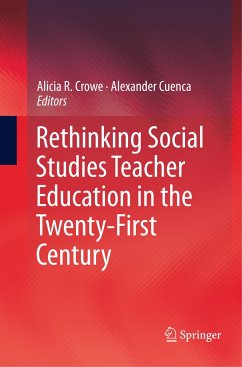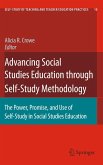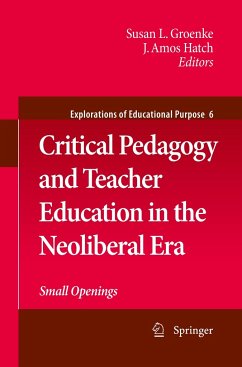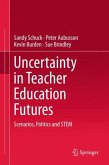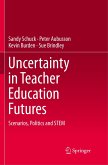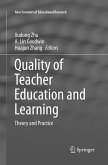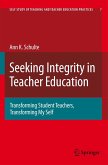Rethinking Social Studies Teacher Education in the Twenty-First Century
Herausgegeben:Crowe, Alicia R.; Cuenca, Alexander
Rethinking Social Studies Teacher Education in the Twenty-First Century
Herausgegeben:Crowe, Alicia R.; Cuenca, Alexander
- Broschiertes Buch
- Merkliste
- Auf die Merkliste
- Bewerten Bewerten
- Teilen
- Produkt teilen
- Produkterinnerung
- Produkterinnerung
In this volume teacher educators explicitly and implicitly share their visions for the purposes, experiences, and commitments necessary for social studies teacher preparation in the twenty-first century. It is divided into six sections where authors reconsider: 1) purposes, 2) course curricula, 3) collaboration with on-campus partners, 4) field experiences, 5) community connections, and 6) research and the political nature of social studies teacher education. The chapters within each section provide critical insights for social studies researchers, teacher educators, and teacher education…mehr
Andere Kunden interessierten sich auch für
![Advancing Social Studies Education Through Self-Study Methodology Advancing Social Studies Education Through Self-Study Methodology]() Advancing Social Studies Education Through Self-Study Methodology75,99 €
Advancing Social Studies Education Through Self-Study Methodology75,99 €![Critical Pedagogy and Teacher Education in the Neoliberal Era Critical Pedagogy and Teacher Education in the Neoliberal Era]() Critical Pedagogy and Teacher Education in the Neoliberal Era75,99 €
Critical Pedagogy and Teacher Education in the Neoliberal Era75,99 €![Uncertainty in Teacher Education Futures Uncertainty in Teacher Education Futures]() Sandy SchuckUncertainty in Teacher Education Futures67,99 €
Sandy SchuckUncertainty in Teacher Education Futures67,99 €![Uncertainty in Teacher Education Futures Uncertainty in Teacher Education Futures]() Sandy SchuckUncertainty in Teacher Education Futures67,99 €
Sandy SchuckUncertainty in Teacher Education Futures67,99 €![Quality of Teacher Education and Learning Quality of Teacher Education and Learning]() Quality of Teacher Education and Learning90,99 €
Quality of Teacher Education and Learning90,99 €![Handbook of Teacher Education Handbook of Teacher Education]() Handbook of Teacher Education224,99 €
Handbook of Teacher Education224,99 €![Seeking Integrity in Teacher Education Seeking Integrity in Teacher Education]() Ann Katherine SchulteSeeking Integrity in Teacher Education75,99 €
Ann Katherine SchulteSeeking Integrity in Teacher Education75,99 €-
-
-
In this volume teacher educators explicitly and implicitly share their visions for the purposes, experiences, and commitments necessary for social studies teacher preparation in the twenty-first century. It is divided into six sections where authors reconsider: 1) purposes, 2) course curricula, 3) collaboration with on-campus partners, 4) field experiences, 5) community connections, and 6) research and the political nature of social studies teacher education. The chapters within each section provide critical insights for social studies researchers, teacher educators, and teacher education programs. Whether readers begin to question what are we teaching social studies teachers for, who should we collaborate with to advance teacher learning, or how should we engage in the politics of teacher education, this volume leads us to consider what ideas, structures, and connections are most worthwhile for social studies teacher education in the twenty-first century to pursue.
Produktdetails
- Produktdetails
- Verlag: Springer / Springer International Publishing / Springer, Berlin
- Artikelnr. des Verlages: 978-3-319-79438-9
- Softcover reprint of the original 1st ed. 2016
- Seitenzahl: 464
- Erscheinungstermin: 27. März 2019
- Englisch
- Abmessung: 235mm x 155mm x 25mm
- Gewicht: 698g
- ISBN-13: 9783319794389
- ISBN-10: 3319794388
- Artikelnr.: 54772230
- Herstellerkennzeichnung
- Springer-Verlag GmbH
- Tiergartenstr. 17
- 69121 Heidelberg
- ProductSafety@springernature.com
- Verlag: Springer / Springer International Publishing / Springer, Berlin
- Artikelnr. des Verlages: 978-3-319-79438-9
- Softcover reprint of the original 1st ed. 2016
- Seitenzahl: 464
- Erscheinungstermin: 27. März 2019
- Englisch
- Abmessung: 235mm x 155mm x 25mm
- Gewicht: 698g
- ISBN-13: 9783319794389
- ISBN-10: 3319794388
- Artikelnr.: 54772230
- Herstellerkennzeichnung
- Springer-Verlag GmbH
- Tiergartenstr. 17
- 69121 Heidelberg
- ProductSafety@springernature.com
Introduction: What are we teaching social studies (teachers) for? Alicia Crowe, Kent State University, Alexander Cuenca, Saint Louis University.- Section 1: Rethinking Social Studies Teacher Education Purposes.- Section 1 Introduction, Crowe and Cuenca.- Chapter 1: From Non-Racism to Anti-Racism in Social Studies Teacher Education: Social Studies and Racial Pedagogical Content Knowledge, LaGarrett J. King, Clemson University, Prentice T. Chandler, University of Cincinnati.- Chapter 2: Challenging Neoliberal Perspectives: A Framework for Humanizing Social Studies Teacher Education, Brooke Blevins, Baylor University, Tony L. Talbert, Baylor University.- Chapter 3: Teaching Social Studies to These Students in This Place: Exploring Place in Social Studies Teacher Education, Whitney G. Blankenship, Rhode Island College, Michelle Reidel, Georgia Southern University, Caroline C. Sullivan, Georgia State University.- Section 2: Rethinking Course Curriculum.- Section 2 Introduction.- Chapter 4: No More Playing in the Dark: Twenty-first Century Citizenship, Critical Race Theory, and the Future of the Social Studies Methods Course, Patricia L. Marshall, Meghan M. Manfra, Crystal G. Simmons, North Carolina State University.- Chapter 5: Preparing Elementary Pre-Service Teachers to Promote Big Ideas Within Social Studies, Sarah Brooks, Millersville University, Dan Jares, Elmhurst College.- Chapter 6: Rooting the Literacies of Citizenship: Ideas that Integrate Social Studies and Language Arts in the Cultivation of a New Global Mindset, Debra D. Shulsky, Elaine Y. Hendrix, University of Houston-Clear Lake.- Section 3: Rethinking Campus Connections.- Section 3 Introduction.- Chapter 7: Working Together, Not Sharing the Burden: A Collaborative Approach to Developing Pedagogical Content Knowledge with Secondary Social Studies Pre-Service Teachers, Wayne Journell, University of North Carolina-Greensboro, Lisa C. Tolbert, University of North Carolina-Greensboro.- Chapter 8: SixCredit Hours For Arizona, The United States, and The World: A Case Study of Teacher Content-Knowledge Preparation and the Creation of Social Studies Courses, Laura Turchi, University of Houston, Elizabeth Hinde, Arizona State University, Ronald I. Dorn, Arizona State University, Gale Ekiss, Arizona Geographic Alliance .- Chapter 9: Overcoming Problems of Marginalization by Reimagining Elementary Social Studies Programs, Annie Whitlock, University of Michigan-Flint, Kristy Brugar, University of Oklahoma, Anne Lise-Halvorsen, Michigan State University.- Chapter 10: Collaboration in Social Studies Teacher Education: Crossing (Disciplinary) Lines, Margaret Weiss, George Mason University, Anthony Pellegrino, George Mason University.- Chapter 11: "As long as I see you on Facebook I know you are safe": Social Media Experiences as Pedagogy, Daniel G. Krutka, Texas Women's University, Kenneth T. Carano, Western Oregon University.- Section 4: Rethinking School Relationships.- Section 4 Introduction.-Chapter 12: Reciprocity and Relationship: Urban Teacher Preparation Through Partnership, Jehanne Beaton, University of Minnesota, J. B. Mayo, Jr. University of Minnesota.- Chapter 13: Expanding Civic Worldviews: Teaching for Citizenship in an Alternative School Setting, Antonio J. Castro, University of Missouri, Kari Muente, University of Missouri.- Chapter 14: Learning In and Through Practice: A Case Study of a Design-Based Residency Program, Andrew L. Hostetler, Vanderbilt University.- Section 5: Rethinking Community Connections.- Section 5 Introduction.- Chapter 15: Intersections of Culture and Community: Developing a Critical Sense of Place in Social Studies Teacher Education, Jason Harshman, University of Iowa.- Chapter 16: Examining Community with Pre-service Teachers through the Use of Participatory Photography Projects, Sarah Mathews, Florida International University, Erin Crews Adams, University of Georgia.- Chapter 17: Place-Based Social Studies Teacher Education:Learning to Teach for Ecological Citizenship While Investigating Local Waste Issues, Mark T. Kissling, Penn State University.- Section 6: Rethinking Research, Policy, and Advocacy.- Section 6 Introduction.- Chapter 18 Self-study as Professional Development for a Novice Social Studies Teacher Educator, Shawn Michael Bullock, Simon Fraser University, Theodore Michael Christou, Queen's University.- Chapter 19 Using Big Data, Large-Scale Studies, Secondary Datasets, and Secondary Data Analysis as Tools to Inform Social Studies Teaching and Learning, Tina L. Heafner, University of North Carolina-Charlotte, Paul G. Fitchett, University of North Carolina-Charlotte, Ryan Knowles, University of Missouri.- Chapter 20 Stand(ards) and deliver: Yet another standards-based framework and the ground-level work of pre-service teacher education, Todd Dinkelman, University of Georgia, Kimberly Logan, University of Georgia, Alex Cuenca, St. Louis University.- Chapter 21 Supporting the Political Practice of Social Studies Teaching Across the Teacher Education Continuum, Kevin W. Meuwissen, University of Rochester, Marcy L. Barger, University of Rochester.- Index.
Introduction: What are we teaching social studies (teachers) for? Alicia Crowe, Kent State University, Alexander Cuenca, Saint Louis University.- Section 1: Rethinking Social Studies Teacher Education Purposes.- Section 1 Introduction, Crowe and Cuenca.- Chapter 1: From Non-Racism to Anti-Racism in Social Studies Teacher Education: Social Studies and Racial Pedagogical Content Knowledge, LaGarrett J. King, Clemson University, Prentice T. Chandler, University of Cincinnati.- Chapter 2: Challenging Neoliberal Perspectives: A Framework for Humanizing Social Studies Teacher Education, Brooke Blevins, Baylor University, Tony L. Talbert, Baylor University.- Chapter 3: Teaching Social Studies to These Students in This Place: Exploring Place in Social Studies Teacher Education, Whitney G. Blankenship, Rhode Island College, Michelle Reidel, Georgia Southern University, Caroline C. Sullivan, Georgia State University.- Section 2: Rethinking Course Curriculum.- Section 2 Introduction.- Chapter 4: No More Playing in the Dark: Twenty-first Century Citizenship, Critical Race Theory, and the Future of the Social Studies Methods Course, Patricia L. Marshall, Meghan M. Manfra, Crystal G. Simmons, North Carolina State University.- Chapter 5: Preparing Elementary Pre-Service Teachers to Promote Big Ideas Within Social Studies, Sarah Brooks, Millersville University, Dan Jares, Elmhurst College.- Chapter 6: Rooting the Literacies of Citizenship: Ideas that Integrate Social Studies and Language Arts in the Cultivation of a New Global Mindset, Debra D. Shulsky, Elaine Y. Hendrix, University of Houston-Clear Lake.- Section 3: Rethinking Campus Connections.- Section 3 Introduction.- Chapter 7: Working Together, Not Sharing the Burden: A Collaborative Approach to Developing Pedagogical Content Knowledge with Secondary Social Studies Pre-Service Teachers, Wayne Journell, University of North Carolina-Greensboro, Lisa C. Tolbert, University of North Carolina-Greensboro.- Chapter 8: SixCredit Hours For Arizona, The United States, and The World: A Case Study of Teacher Content-Knowledge Preparation and the Creation of Social Studies Courses, Laura Turchi, University of Houston, Elizabeth Hinde, Arizona State University, Ronald I. Dorn, Arizona State University, Gale Ekiss, Arizona Geographic Alliance .- Chapter 9: Overcoming Problems of Marginalization by Reimagining Elementary Social Studies Programs, Annie Whitlock, University of Michigan-Flint, Kristy Brugar, University of Oklahoma, Anne Lise-Halvorsen, Michigan State University.- Chapter 10: Collaboration in Social Studies Teacher Education: Crossing (Disciplinary) Lines, Margaret Weiss, George Mason University, Anthony Pellegrino, George Mason University.- Chapter 11: "As long as I see you on Facebook I know you are safe": Social Media Experiences as Pedagogy, Daniel G. Krutka, Texas Women's University, Kenneth T. Carano, Western Oregon University.- Section 4: Rethinking School Relationships.- Section 4 Introduction.-Chapter 12: Reciprocity and Relationship: Urban Teacher Preparation Through Partnership, Jehanne Beaton, University of Minnesota, J. B. Mayo, Jr. University of Minnesota.- Chapter 13: Expanding Civic Worldviews: Teaching for Citizenship in an Alternative School Setting, Antonio J. Castro, University of Missouri, Kari Muente, University of Missouri.- Chapter 14: Learning In and Through Practice: A Case Study of a Design-Based Residency Program, Andrew L. Hostetler, Vanderbilt University.- Section 5: Rethinking Community Connections.- Section 5 Introduction.- Chapter 15: Intersections of Culture and Community: Developing a Critical Sense of Place in Social Studies Teacher Education, Jason Harshman, University of Iowa.- Chapter 16: Examining Community with Pre-service Teachers through the Use of Participatory Photography Projects, Sarah Mathews, Florida International University, Erin Crews Adams, University of Georgia.- Chapter 17: Place-Based Social Studies Teacher Education:Learning to Teach for Ecological Citizenship While Investigating Local Waste Issues, Mark T. Kissling, Penn State University.- Section 6: Rethinking Research, Policy, and Advocacy.- Section 6 Introduction.- Chapter 18 Self-study as Professional Development for a Novice Social Studies Teacher Educator, Shawn Michael Bullock, Simon Fraser University, Theodore Michael Christou, Queen's University.- Chapter 19 Using Big Data, Large-Scale Studies, Secondary Datasets, and Secondary Data Analysis as Tools to Inform Social Studies Teaching and Learning, Tina L. Heafner, University of North Carolina-Charlotte, Paul G. Fitchett, University of North Carolina-Charlotte, Ryan Knowles, University of Missouri.- Chapter 20 Stand(ards) and deliver: Yet another standards-based framework and the ground-level work of pre-service teacher education, Todd Dinkelman, University of Georgia, Kimberly Logan, University of Georgia, Alex Cuenca, St. Louis University.- Chapter 21 Supporting the Political Practice of Social Studies Teaching Across the Teacher Education Continuum, Kevin W. Meuwissen, University of Rochester, Marcy L. Barger, University of Rochester.- Index.

